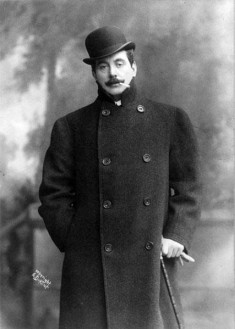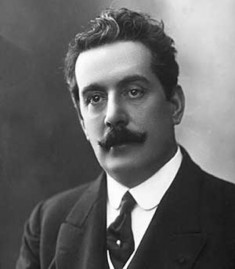| Giacomo Puccini | |
|---|---|
 |
|
| Composer | |
| Specialty | Operas |
| Born | Dec. 22, 1858 |
| Died | Nov. 29, 1924 |
| Nationality | Italian |
Giacomo Puccini was an Italian composer. He is particularly known for his operas and is generally considered to be rivaled only by Verdi among Italian operatic composers. In his early career, Puccini generally kept close to the traditional ideals of Victorian romantic opera. However, he later progressed to a more realistic style he called “verismo,” of which he was considered a master.
Puccini has remained consistently popular with audiences, although academic opinion is somewhat more divided on account of that very popularity: his work has sometimes been criticized for pandering to popular tastes.
Early Life
Puccini was born in the Tuscan city of Lucca on December 22, 1858. His family had a strong musical background which contained several composers. He was initially taught the rudiments of music by an uncle, and he also received some tutelage from Angeloni, a well-known instructor in the area.
Puccini’s career really began when he was 14 and became employed at several local churches as an organist. In 1876, he obtained wider attention when he gave a rapturously received performance of Aida, Verdi’s great opera, in Pisa. Puccini was so gratified by this response that he set himself to compose his own operas. Another uncle supported him financially, allowing him to enroll in the Milan Conservatory.
Beginnings of a Musical Career
Puccini remained a student from 1880 to 1883, being taught by Ponchielli and Bazzini. In 1882, the Sonzogno publishers announced a contest for an opera in one act, and Puccini entered his own composition, Le villi. This was not the winning entry, but it nevertheless attracted the attention of another publisher, Guilio Ricordi.
He decided to put on a production of Puccini’s piece at Milan’s Teatro del Verme. He also commissioned a further opera from Puccini and his librettist, Fontana. The new work, Edgar, was rather poorly received when it premiered at La Scale in 1889, partly because the libretto did not mesh well with the music itself.
Growing International Recognition
 The subject of Puccini’s next opera was entirely his own choice. Manon Lescaut debuted in 1893 at Turin and was such a great success that he became well known across Europe. In fact, he never exceeded the triumph he had obtained here.
The subject of Puccini’s next opera was entirely his own choice. Manon Lescaut debuted in 1893 at Turin and was such a great success that he became well known across Europe. In fact, he never exceeded the triumph he had obtained here.
The librettists included Giacosa and Illica, both of whom performed the same task for several more operas. La bohème was the first, and today is generally considered to be among Puccini’s greatest works. However, its blend of conversation and light sentimentality was poorly received on its 1896 production in Turin. Four years later, he came out with Tosca, which had a much better reception from the audience when it was produced in Rome.
Later in 1900, Puccini went to London. While there, he attended the play Madam Butterfly by Belasco. He was inspired to write an opera of the story, again with Giacosa and Illica providing the libretto. Puccini was extremely satisfied with his work, rating it his best and most complex opera.
However, disaster struck on its 1904 La Scala premiere when several of Puccini’s rivals, jealous at his success, roused the audience into giving a vocally negative reaction. Puccini, undeterred, revised the opera somewhat and put it on in Brescia in 1905, where it was much more positively received.
Puccini’s Later Career
Puccini married in the early 1900s. In 1909, a young servant in the couple’s household killed herself after being accused of having an affair with the composer by his new wife. The girl’s innocence was established in court, but Puccini was deeply upset by the scandal and waited many months before resuming work on operas. His next one did not appear until the last weeks of 1910, and La fanciulla del West was, like Madam Butterfly, based on a play by Belasco. It was well received on its initial performance in New York, but its relative lack of memorable phrases has led to it falling somewhat into obscurity outside Puccini’s homeland.
Shortly afterward, Puccini had a falling out with the Ricordi Company and his 1917 operetta, La rondine, was commissioned by a theater in Vienna. It is not generally considered to be among the composer’s best works, but it was still politely received on its Monte Carlo debut. As he entered his 60s, Puccini still hoped to break new musical ground. It was now that he began to work on Turandot, which once again was based on a play.
By now, he was living in Viareggio. In 1923 he fell seriously ill with throat cancer. Although treatment in Brussels showed initial promise, Puccini was not strong enough for the accompanying operation and he died of a heart attack on November 29, 1924. Turandot was finished by Alfano, his collaborator.